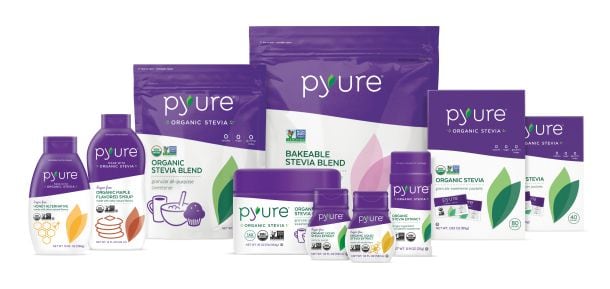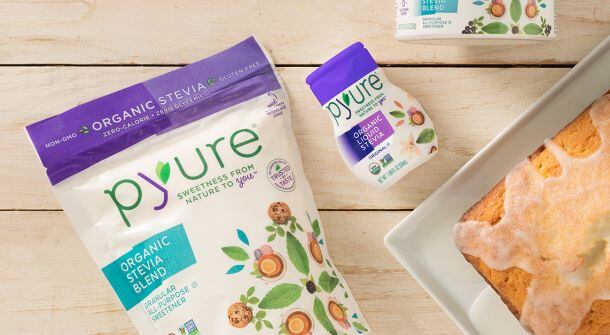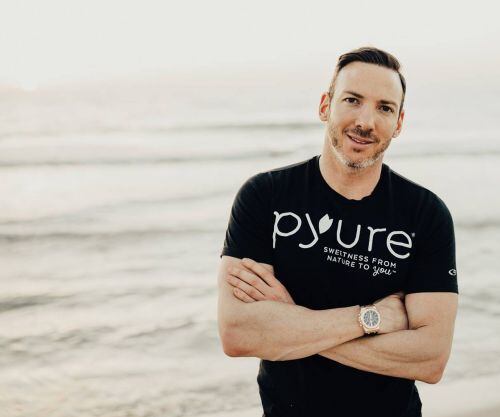Florida-based Pyure Brands – which was founded by Ben Fleischer in 2008 with $200k of his own cash and is still 100% owned by him – is growing strongly as consumers embrace organic and non-GMO options in a category that has started to get confusing for consumers, VP sales & marketing Mark Eisenacher told FoodNavigator-USA.
“Some of the big names [in table stevia-based sweeteners] such as Truvia, Stevia in the Raw and PureVia are pretty flat, while we are growing 50% year-on-year.”
Phenomenal growth
Revenues – which are split fairly evenly between retail and industrial customers - will be “fast approaching $20m,” in 2017, added Eisenacher, who said business with Amazon really started to take off after more dedicated resources were put behind the platform around 18 months ago.
“Our Walmart sales are up 30% year-on-year and Walmart is our biggest retail customer at this point, but we’re seeing phenomenal growth on Amazon, which is quickly becoming our second largest customer.”
In bricks and mortar accounts, he said, “Category leaders still dictate the shelf set to some extent, regardless of performance, and even if your sales are great, you still have to wait a year or even more for the reset [when you might secure more facings].
“By contrast, anyone can list their products on Amazon, and if you perform well and get great reviews, you move up in terms of search and placement very quickly; things happen in real time, you don’t have to wait for the re-set. It’s more of a meritocracy, and that’s insanely disruptive.”
Through YouTube videos, native advertising, Amazon advertising and digital banners, meanwhile, Pyure Brands has also been seeking to attract a younger demographic, he added: “If you’re effective with your digital advertising and you have a good website and good social media and you can control that message and that sales funnel, the ability to convert on Amazon is phenomenal. Right now 55% + of retail searches for consumer products start on Amazon, not Google, and there’s purchase intent there.”

Pyure is not just a Whole Foods, specialty product
In the bricks & mortar space, the tabletop sweeteners category is a bit of a mixed bag right now, with “artificials declining 7-9%, and stevia growing at around 1-2%,” said Eisenacher.
Retailers are re-allocating space to reflect the new reality, although the deep pockets of some of the established players have enabled them to retain space that their sales arguably do not warrant, he said.
“They aren’t taking artificials away because there’s still a lot of volume and dollar sales there and a ton of trade money, but we are making the case to them that if they reduce their Equal [aspartame] or Sweet n’ Low [saccharin] facings from five to three, or seven to five, and give us more space instead, we can bring real growth to the category.”
As for Pyure’s potential, he added: “The fact we’re growing so strongly at Walmart proves this is not just a Whole Foods, specialty product.”

Diabetics know dextrose is a sugar
But what is it about Pyure that has resonated with category shoppers?
Consistent positioning – it’s organic and non-GMO - and a commitment to using bulking agents (notably erythritol) that won’t raise your blood sugar, said Fleischer, who claimed shoppers, particularly those with diabetes, are rightly confused by the presence of dextrose in stevia-based sweeteners such as Zing, PureVia, Stevia in the Raw, and Skinnygirl.
Dextrose is a simple sugar (D-glucose) but can be used in sweeteners marketed as having zero sugar and zero calories owing to labeling rules that allow foods with fewer than five calories per serving to be labeled in this way, explained Fleischer
“But diabetics know dextrose is a sugar, so these products are just confusing.”
Other brands, meanwhile, have paired stevia with sugar (sucrose), notably the now-defunct Sun Crystals), while Truvia’s Nectar syrup combines stevia with sugar and honey, but sits alongside sugar-free products such as Pyure’s honey alternative, which is made with soluble tapioca fiber, and is suitable for diabetics because it doesn’t raise blood sugar, he explained.

It’s a David v Goliath story…
He added: “It’s a real David and Goliath story. We’re up against all these big sugar companies and don’t have the marketing spend of Truvia [owned by Cargill] or Cumberland [Sweet n’Low, Stevia in the Raw] but the fact we’ve been so successful in spite of this is a testament to the quality of our products.

“We were first to market with organic and non-GMO stevia and erythritol, and we’re still innovating; we’re looking at chocolate, baking mixes, more flavors for the liquids, but we could also get into beverages, frozen novelties as we’ve built up so much experience in working with these products from the industrial side of the business.”
The industrial arm grew almost by accident, however, he said. “Initially I wanted to create a retail brand, but as we started to have success in retail, we started getting calls from small food and beverage manufacturers asking us if we could supply them, and it just grew from there.”
While businesses that reach a certain size will ultimately buy direct from Chinese manufacturers, acknowledged Eisenacher, Pyure has “found sweet spot with emerging organic and non GMO brands that love our flexibility; we warehouse on the east and west coast and have containers of stevia and erythritol coming in every other week.”
Tooth friendly, zero calorie (0.2cals/g), good for diabetics (it doesn’t raise blood sugar), and well-tolerated in the gut, erythritol is about 60-70% as sweet as sugar.
It also blends well with high intensity sweeteners such as stevia and is used in everything from ice cream, confectionery, baked goods, beverages, and table-top sweeteners such as Pyure Brands.
However, some consumers seeking non-GMO options have objected to it because firms producing erythritol in commercial quantities typically do so via fermentation, where a sugar-rich substrate that is often derived from genetically engineered corn, is fermented by a yeast strain to yield erythritol. Pyure Brands – which has organic and Non-GMO Project certifications – sources erythritol from a partner that uses non-GMO corn as its feedstock.
